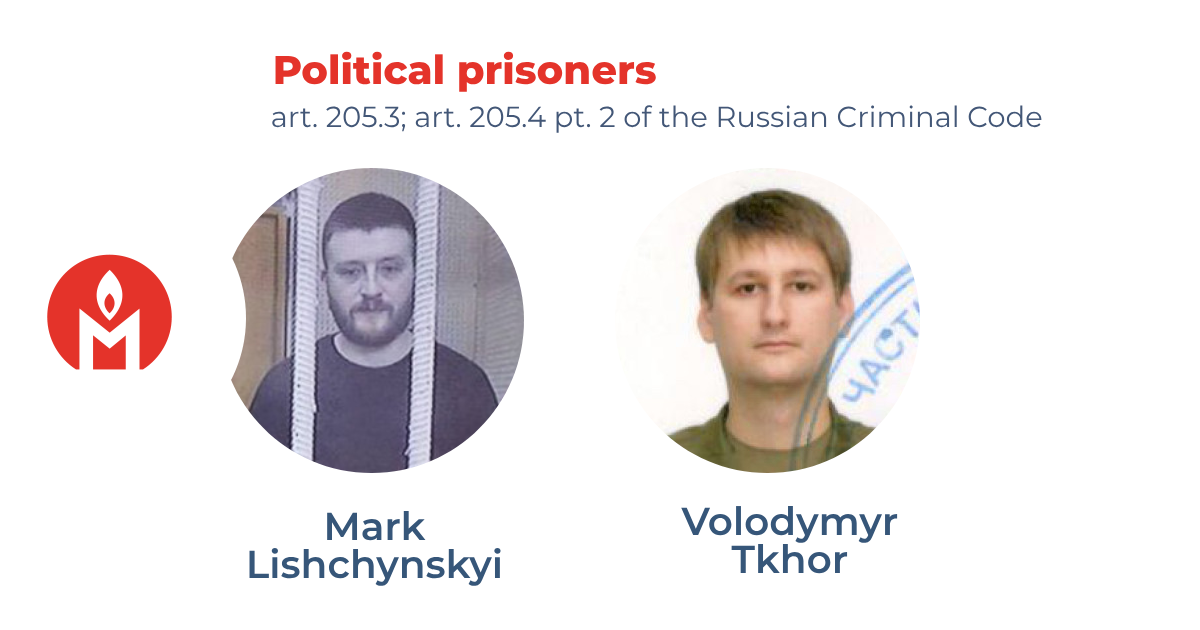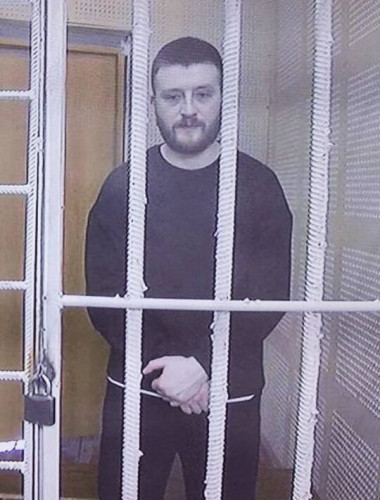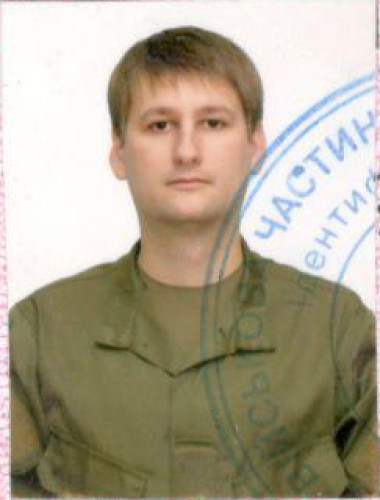Mark Lishchynskyi and Volodymyr Tkhor are political prisoners
Two Ukrainians have been sentenced to 18 and five and a half years’ imprisonment for serving in the Azov Regiment
The ‘Political Prisoners. Memorial’ human rights project, in accordance with international standards, considers Mark Lishchynskyi and Volodymyr Tkhor political prisoners. The two were convicted of participating in a terrorist organisation for serving in the Azov Regiment. Lishchynskyi was also convicted of training for terrorist activities. The prosecution and conviction of Mark Lishchynskyi and Volodymyr Tkhor violated their rights and freedoms guaranteed under the Geneva Convention on the Treatment of Prisoners of War. We demand the immediate release of Mark Lishchynskyi and Volodymyr Tkhor, that all criminal charges against them be dropped, and that the Russian authorities ensure their treatment in compliance with international law.

What were the charges against Mark Lishchynskyi and Volodymyr Tkhor?
Mark Lishchynskyi and Volodymyr Tkhor served in the National Guard of Ukraine. In May 2022, they were taken prisoner by the Russian armed forces at the Azovstal steel plant in Mariupol. According to the prosecution, the two men had served in the Azov special forces unit.
As a result, both were charged with participation in a terrorist organisation (Article 205.4, Part 2, of the Russian Criminal Code). Lishchynskyi was also charged with undergoing training for terrorist activities (Article 205.3). Both men pleaded guilty.
On 12 November 2024, a military court in Rostov-on-Don sentenced Lishchynskyi to 18 years in a strict regime penal colony. On 21 November 2024, Tkhor was sentenced to five and a half years in a general regime penal colony.
Why do we consider Lishchynskyi and Tkhor political prisoners?
Lishchynskyi and Tkhor have not been convicted of any specific violent crime, but rather for serving in the Azov Regiment. There is no legal basis for charging them with participation in a terrorist organisation since the Azov Regiment is an official unit of the National Guard of Ukraine (the unit was redesignated as the Azov Brigade in February 2023).
Lishchynskyi underwent military training for combat operations, not for terrorist purposes. Military training cannot be grounds for criminal prosecution.
All captured service personnel from the Ukrainian armed forces and National Guard have the status of prisoners of war and cannot be prosecuted merely for participating in hostilities during an armed conflict. The criminal prosecution of Lishchynskyi and Tkhor constitutes a grave violation of the Geneva Convention on the Treatment of Prisoners of War.
It appears that Lishchynskyi and Tkhor may have been coerced into confessing under pressure and threats. Moreover, they had no access to a legal representative.
Their conditions of detention also raised serious concerns among human rights defenders. Under international law, the cumulative violations committed by the Russian Federation against Ukrainian prisoners of war may amount to a war crime.
A detailed description of the cases of Mark Lishchynskyi and Volodymyr Tkhor and of our position is available on our website.
Recognition of an individual as a political prisoner does not imply the ‘Political Prisoners. Memorial’ human rights project agrees with, or approves, their views, statements, or actions.
How can you help?
You can write to Mark Lishchynskyi and Volodymyr Tkhor at the following addresses:
RU:
660079, Красноярск, ул. Парашютная, д. 3, ФКУ ИК-6 ГУФСИН России по Красноярскому краю, Лищинскому Марку Андреевичу, 1998 г. р.
162840, Вологодская область, г. Устюжна, ул. Карла Маркса, д. 57, ФКУ ИК-20 УФСИН России по Вологодской области, Тхору Владимиру Валентиновичу, 1986 г. р.
EN:
Mark Andriyovych Lishchynskyi (born 1998), Penal Colony No. 6, Federal Penitentiary Service of Russia for Krasnoyarsk Krai, 3 Parashyutnaya Street, Krasnoyarsk, 660079, Russia.
Volodymyr Valentynovych Tkhor (born 1986), Penal Colony No. 20, Federal Penitentiary Service of Russia for Vologda Oblast, 57 Karla Marksa Street, Ustyuzhna, Vologda Oblast, 162840, Russia.
You can also send emails via the ZT service (for payment with Russian bank cards), OVD-Info and Memorial-France (free of charge).
Please note that letters in languages other than Russian are highly unlikely to reach the intended recipient.
You can donate to help all political prisoners in Russia.

